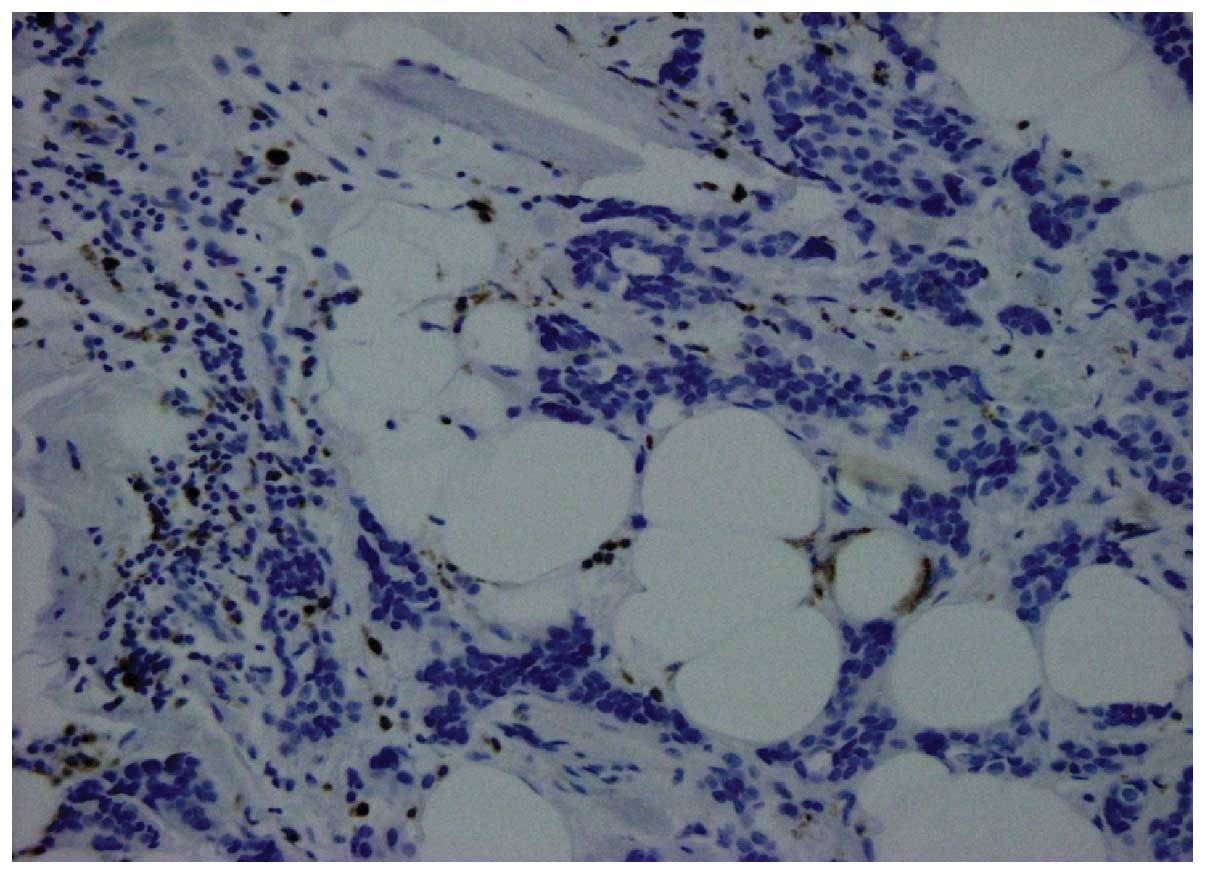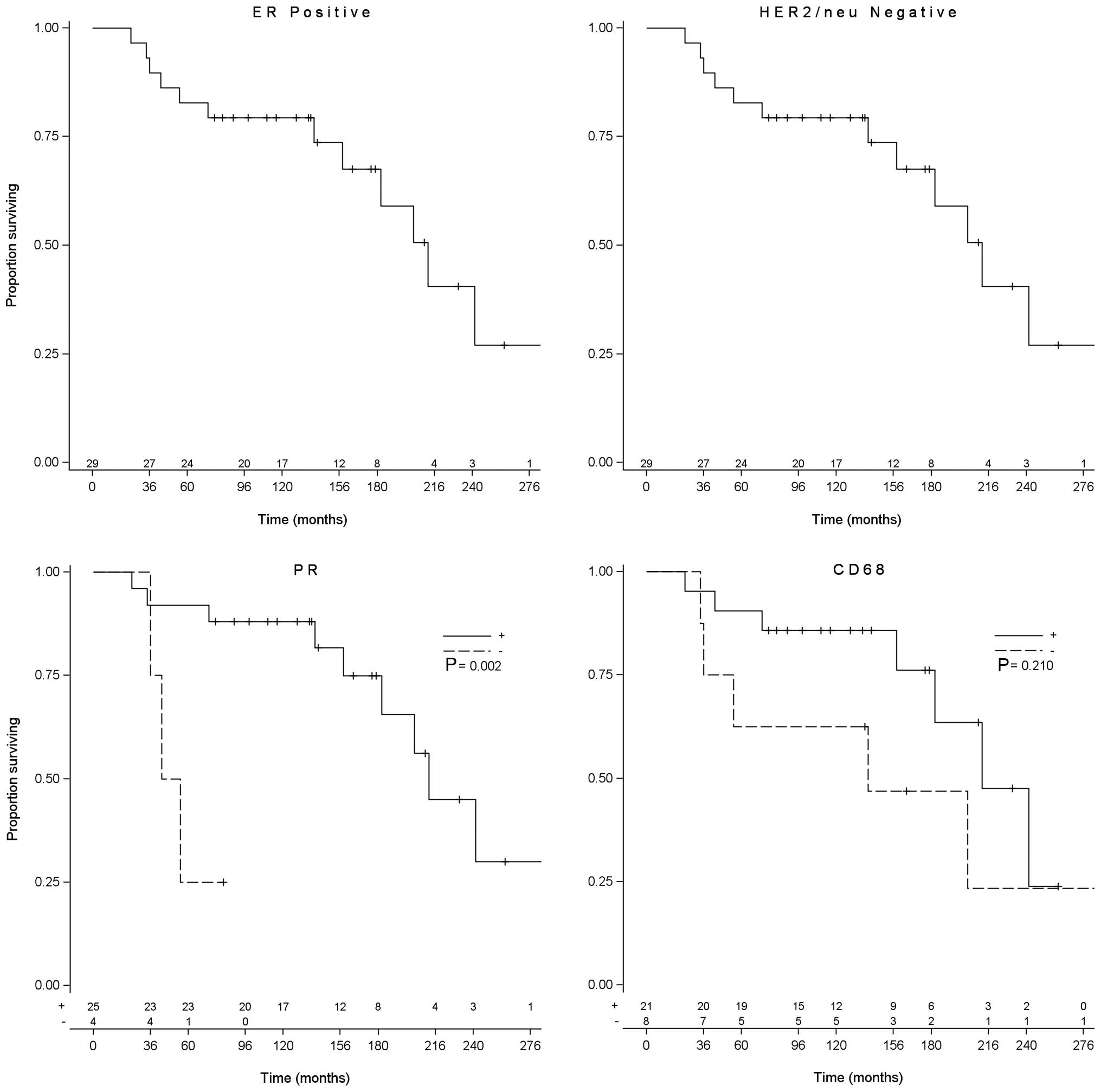|
1
|
Jemal A, Siegel R, Xu J and Ward E: Cancer
statistics. CA Cancer J Clin. 60:277–300. 2010.
|
|
2
|
Karlsson E, Danielsson A, Delle U, et al:
Chromosomal changes associated with clinical outcome in lymph
node-negative breast cancer. Cancer Genet Cytogenet. 172:139–146.
2007. View Article : Google Scholar : PubMed/NCBI
|
|
3
|
Eng-Wong J and Isaacs C: Prediction of
benefit from adjuvant treatment in patients with breast cancer.
Clin Breast Cancer. 10(Suppl 1): E32–E37. 2010. View Article : Google Scholar : PubMed/NCBI
|
|
4
|
Oakman C, Bessi S, Zafarana E, et al:
Recent advances in systemic therapy: new diagnostics and biological
predictors of outcome in early breast cancer. Breast Cancer Res.
11:2052009. View
Article : Google Scholar : PubMed/NCBI
|
|
5
|
Marchionni L, Wilson RF, Marinopoulos SS,
et al: Impact of gene expression profiling tests on breast cancer
outcomes. Evid Rep Technol Assess (Full Rep). 1–105.
2007.PubMed/NCBI
|
|
6
|
Perreard L, Fan C, Quackenbush JF, et al:
Classification and risk stratification of invasive breast
carcinomas using a real-time quantitative RT-PCR assay. Breast
Cancer Res. 8:R232008. View
Article : Google Scholar : PubMed/NCBI
|
|
7
|
Sica A, Larghi P, Mancino A, et al:
Macrophage polarization in tumour progression. Semin Cancer Biol.
18:349–355. 2008. View Article : Google Scholar : PubMed/NCBI
|
|
8
|
Pollard JW: Macrophages define the
invasive microenvironment in breast cancer. J Leukoc Biol.
84:623–630. 2008. View Article : Google Scholar : PubMed/NCBI
|
|
9
|
Qian BZ, Li J, Zhang H, et al: CCL2
recruits inflammatory monocytes to facilitate breast-tumour
metastasis. Nature. 475:222–225. 2011. View Article : Google Scholar : PubMed/NCBI
|
|
10
|
Sica A, Saccani A and Mantovani A:
Tumor-associated macrophages: a molecular perspective. Int
Immunopharmacol. 2:1045–1054. 2002. View Article : Google Scholar : PubMed/NCBI
|
|
11
|
Leek RD and Harris AL: Tumor-associated
macrophages in breast cancer. J Mammary Gland Biol Neoplasia.
7:177–189. 2002. View Article : Google Scholar : PubMed/NCBI
|
|
12
|
Zhang BC, Gao J, Wang J, et al:
Tumor-associated macrophages infiltration is associated with
peritumoral lymphangiogenesis and poor prognosis in lung
adenocarcinoma. Med Oncol. 28:1447–1452. 2011. View Article : Google Scholar : PubMed/NCBI
|
|
13
|
Zhang B, Yao G, Zhang Y, et al:
M2-polarized tumor-associated macrophages are associated with poor
prognoses resulting from accelerated lymphangiogenesis in lung
adenocarcinoma. Clinics (São Paulo). 66:1879–1886. 2011.PubMed/NCBI
|
|
14
|
Chen JJ, Lin YC, Yao PL, et al:
Tumor-associated macrophages: the double-edged sword in cancer
progression. J Clin Oncol. 23:953–964. 2005. View Article : Google Scholar : PubMed/NCBI
|
|
15
|
Mantovani A, Sica A, Allavena P, Garlanda
C and Locati M: Tumor-associated macrophages and the related
myeloid-derived suppressor cells as a paradigm of the diversity of
macrophage activation. Hum Immunol. 70:325–330. 2009. View Article : Google Scholar : PubMed/NCBI
|
|
16
|
MacMicking J, Xie QW and Nathan C: Nitric
oxide and macrophage function. Annu Rev Immunol. 15:323–350. 1997.
View Article : Google Scholar : PubMed/NCBI
|
|
17
|
Fedewa SA, Edge SB, Stewart AK, et al:
Race and ethnicity are associated with delays in breast cancer
treatment (2003–2006). J Health Care Poor Underserved. 22:128–141.
2011.
|
|
18
|
Miranda PY, Tarraf W and Gonzalez HM:
Breast cancer screening and ethnicity in the United States:
implications for health disparities research. Breast Cancer Res
Treat. 128:535–542. 2011. View Article : Google Scholar : PubMed/NCBI
|
|
19
|
Miranda PY, Tarraf W, Gonzalez P,
Johnson-Jennings M and Gonzalez HM: Breast cancer screening trends
in the United States and ethnicity. Cancer Epidemiol Biomarkers
Prev. 21:351–357. 2012. View Article : Google Scholar : PubMed/NCBI
|
|
20
|
McGuire WL, De La Garza M and Chamness GC:
Evaluation of estrogen receptor assays in human breast cancer
tissue. Cancer Res. 37:637–639. 1977.PubMed/NCBI
|
|
21
|
Bloom HJ and Richardson WW: Histological
grading and prognosis in breast cancer; a study of 1409 cases of
which 359 have been followed for 15 years. Br J Cancer. 11:359–377.
1957.PubMed/NCBI
|
|
22
|
Elston CW: The assessment of histological
differentiation in breast cancer. Aust NZ J Surg. 54:11–15. 1984.
View Article : Google Scholar : PubMed/NCBI
|
|
23
|
Elston CW and Ellis IO: Pathological
prognostic factors in breast cancer. I The value of histological
grade in breast cancer: experience from a large study with
long-term follow-up. Histopathology. 19:403–410. 1991. View Article : Google Scholar
|
|
24
|
Berrang TS, Lesperance M, Truong PT, et
al: Which prediction models best identify additional axillary
disease after a positive sentinel node biopsy for breast cancer?
Breast Cancer Res Treat. 133:695–702. 2012. View Article : Google Scholar
|
|
25
|
Arslan AA, Silvera D, Arju R, et al:
Atypical ezrin localization as a marker of locally advanced breast
cancer. Breast Cancer Res Treat. 134:981–988. 2012. View Article : Google Scholar : PubMed/NCBI
|
|
26
|
Mook S, Knauer M, Bueno-de-Mesquita JM, et
al: Metastatic potential of T1 breast cancer can be predicted by
the 70-gene MammaPrint signature. Ann Surg Oncol. 17:1406–1413.
2010. View Article : Google Scholar : PubMed/NCBI
|
|
27
|
Reis-Filho JS and Pusztai L: Gene
expression profiling in breast cancer: classification,
prognostication, and prediction. Lancet. 378:1812–1823. 2011.
View Article : Google Scholar : PubMed/NCBI
|
|
28
|
Raam S, Gelman R, Cohen JL, et al:
Estrogen receptor assay: interlaboratory and intralaboratory
variations in the measurement of receptors using dextran-coated
charcoal technique: a study sponsored by E.C.O.G. Eur J Cancer.
17:643–649. 1981. View Article : Google Scholar
|
|
29
|
Mahmoud SM, Lee AH, Paish EC, et al:
Tumour-infiltrating macrophages and clinical outcome in breast
cancer. J Clin Pathol. 65:159–163. 2012. View Article : Google Scholar : PubMed/NCBI
|
|
30
|
Shabo I, Stal O, Olsson H, Dore S and
Svanvik J: Breast cancer expression of CD163, a macrophage
scavenger receptor, is related to early distant recurrence and
reduced patient survival. Int J Cancer. 123:780–786. 2008.
View Article : Google Scholar : PubMed/NCBI
|
|
31
|
Lau SK, Chu PG and Weiss LM: CD163: a
specific marker of macrophages in paraffin-embedded tissue samples.
Am J Clin Pathol. 122:794–801. 2004. View Article : Google Scholar : PubMed/NCBI
|
|
32
|
Brown M, Tsodikov A, Bauer KR, Parise CA
and Caggiano V: The role of human epidermal growth factor receptor
2 in the survival of women with estrogen and progesterone
receptor-negative, invasive breast cancer: the California Cancer
Registry, 1999–2004. Cancer. 112:737–747. 2008.PubMed/NCBI
|
|
33
|
Vona-Davis L and Rose DP: The influence of
socioeconomic disparities on breast cancer tumor biology and
prognosis: a review. J Womens Health (Larchmt). 18:883–893. 2009.
View Article : Google Scholar : PubMed/NCBI
|
|
34
|
Bauer KR, Brown M, Cress RD, Parise CA and
Caggiano V: Descriptive analysis of estrogen receptor
(ER)-negative, progesterone receptor (PR)-negative, and
HER2-negative invasive breast cancer, the so-called triple-negative
phenotype: a population-based study from the California Cancer
Registry. Cancer. 109:1721–1728. 2007. View Article : Google Scholar
|
|
35
|
Thakkar JP and Mehta DG: A review of an
unfavorable subset of breast cancer: estrogen receptor positive
progesterone receptor negative. Oncologist. 16:276–285. 2011.
View Article : Google Scholar : PubMed/NCBI
|
|
36
|
Hugh J, Hanson J, Cheang MC, et al: Breast
cancer subtypes and response to docetaxel in node-positive breast
cancer: use of an immunohistochemical definition in the BCIRG 001
trial. J Clin Oncol. 27:1168–1176. 2009. View Article : Google Scholar
|
















